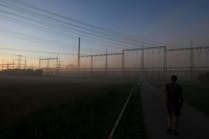More and more firefighters are becoming aware of the potential mental health challenges they face because of their work, and statistics on suicides among first responders reveal a grim reality that requires a lot more attention.
According to a report by USA Today, a new study by the Ruderman Family Foundation—an organization that works for the rights of the disabled—took a look at depression and post-traumatic stress in first responders and the rates of suicide in public safety agencies nationwide.
The data in the report is striking. In 2017, there were 103 firefighters and 140 police officers who committed suicide, a figure which slightly outpaced the 93 firefighters and 129 police officers who died in the line of duty.
The study reveals that first responders are affected by PTSD at a rate five times greater than the average civilian.
Miriam Heyman, one of the co-authors of the study, said the reality may be even worse because the number of suicides is very under-reported.
“It’s really shocking, and part of what’s interesting is that line-of-duty deaths are covered so widely by the press but suicides are not, and it’s because of the level of secrecy around these deaths, which really shows the stigmas,” Heyman told USA Today.
Heyman says departments don't release information on suicides and that less than five percent of them have suicide prevention programs. The shame in opening up and talking about mental health issues among firefighters and police is also a large issue that is having a deadly effect.
"There is not enough conversation about mental health within police and fire departments," the study says. "Silence can be deadly, because it is interpreted as a lack of acceptance and thus morphs into a barrier that prevents first responders from accessing potentially life-saving mental health services."
The report highlights ways to try and alleviate the problem such as peer-to-peer support groups, mental health check-ups and getting time off after responding to a traumatizing incident.
“Police and firefighters witness death and destruction daily,” Heyman says. “It would be silly to think it wouldn’t put a toll on them.”






